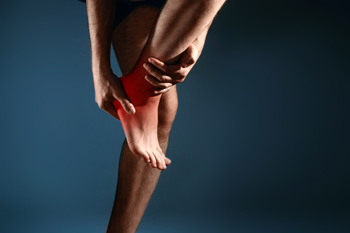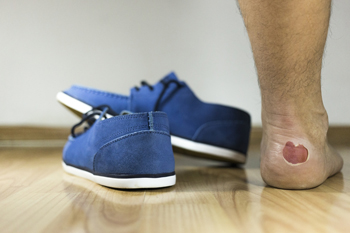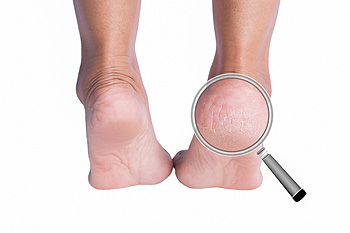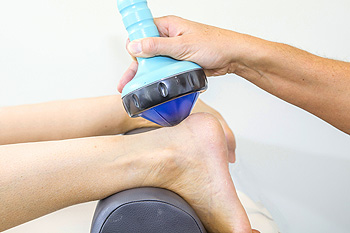 If running and jumping are frequent activities that you participate in, you may experience stress fractures in your feet. It may typically occur as a result of repeated impact the feet endure and will appear as tiny cracks in the bone. The bones in the feet absorb the weight of the body, and this type of fracture is most likely to appear in the lower extremities. Stress fractures may happen to individuals who suddenly increase the intensity or change the type of sport they are engaging in, in addition to having certain medical conditions that may include osteoporosis, which can weaken the bones. There are several symptoms that are associated with this condition, including severe pain and discomfort, swelling, or possible bruising. Research has shown there may be methods than can be implemented, which may prevent a stress fracture from occurring. These may include ingesting a diet that is rich in calcium, which may aid in strengthening the bones, gradually increasing the power of your workout or chosen sport, in addition to wearing shoes that fit correctly. After a proper diagnosis is performed, which will typically include having an X-ray or MRI performed, recovery may begin. If you feel you may have endured a stress fracture, it is suggested to consult with a podiatrist, to discuss correct treatment options.
If running and jumping are frequent activities that you participate in, you may experience stress fractures in your feet. It may typically occur as a result of repeated impact the feet endure and will appear as tiny cracks in the bone. The bones in the feet absorb the weight of the body, and this type of fracture is most likely to appear in the lower extremities. Stress fractures may happen to individuals who suddenly increase the intensity or change the type of sport they are engaging in, in addition to having certain medical conditions that may include osteoporosis, which can weaken the bones. There are several symptoms that are associated with this condition, including severe pain and discomfort, swelling, or possible bruising. Research has shown there may be methods than can be implemented, which may prevent a stress fracture from occurring. These may include ingesting a diet that is rich in calcium, which may aid in strengthening the bones, gradually increasing the power of your workout or chosen sport, in addition to wearing shoes that fit correctly. After a proper diagnosis is performed, which will typically include having an X-ray or MRI performed, recovery may begin. If you feel you may have endured a stress fracture, it is suggested to consult with a podiatrist, to discuss correct treatment options.
Activities where too much pressure is put on the feet can cause stress fractures. To learn more, contact Bruce Smit, DPM from Frankfort Foot & Ankle Clinic. Our doctor can provide the care you need to keep your pain free and on your feet.
Dealing with Stress Fractures of the Foot and Ankle
Stress fractures occur in the foot and ankle when muscles in these areas weaken from too much or too little use. The feet and ankles then lose support when walking or running from the impact of the ground. Since there is no protection, the bones receive the full impact of each step. Stress on the feet can cause cracks to form in the bones, thus creating stress fractures.
What Are Stress Fractures?
Stress fractures occur frequently in individuals whose daily activities cause great impact on the feet and ankles. Stress factors are most common among:
Symptoms
Pain from the fractures occur in the area of the fractures and can be constant or intermittent. It will often cause sharp or dull pain with swelling and tenderness. Engaging in any kind of activity which involves high impact will aggravate pain.
If you have any questions please feel free to contact our office located in Frankfort, IL . We offer the newest diagnostic and treatment technologies for all your foot and ankle needs.
 Research has shown the feet may change sizes as the aging process occurs. Many people may select shoes by the size that is indicated, despite the fact they may not fit properly. It’s important to try both shoes on, which may aid in determining if these are the correct shoes to purchase. Adequate space up to a half inch above the longest toe should be present for maximum comfort while standing up. It’s important to consider the material of the shoe, which may consist of a soft and flexible consistency that ideally should match the shape of the foot. Many people try shoes on that may fit too tightly, and their expectation may be that the shoes will stretch over time. This is considered to an erroneous method of buying shoes and a properly fitted shoe will feel good at the time it is tried on. If you would like additional information on how to buy shoes that fit properly, please consult with a podiatrist who can properly guide you.
Research has shown the feet may change sizes as the aging process occurs. Many people may select shoes by the size that is indicated, despite the fact they may not fit properly. It’s important to try both shoes on, which may aid in determining if these are the correct shoes to purchase. Adequate space up to a half inch above the longest toe should be present for maximum comfort while standing up. It’s important to consider the material of the shoe, which may consist of a soft and flexible consistency that ideally should match the shape of the foot. Many people try shoes on that may fit too tightly, and their expectation may be that the shoes will stretch over time. This is considered to an erroneous method of buying shoes and a properly fitted shoe will feel good at the time it is tried on. If you would like additional information on how to buy shoes that fit properly, please consult with a podiatrist who can properly guide you.
Getting the right shoe size is an important part of proper foot health. Seek the assistance of Bruce Smit, DPM from Frankfort Foot & Ankle Clinic. Our doctor will provide the care you need to keep you pain-free and on your feet.
Getting the Right Shoe Size
There are many people who wear shoes that are the incorrect size, negatively affecting their feet and posture. Selecting the right shoes is not a difficult process, so long as you keep several things in mind when it comes to choosing the right pair.
As our feet hold our body weight and keep us moving, it is important to treat them right. Picking the right pair of shoes can provide your feet comfort and mobility without pain.
If you have any questions, please feel free to contact our office located in Frankfort, IL . We offer the newest diagnostic and treatment technologies for all your foot care needs.
 Research has shown blisters to be the most common medical condition among marathon runners. This may be a result of continued friction caused from the sock or shoe that is worn while running. As the skin becomes gradually damaged, the body creates a bubble containing fluid to act as a natural protectant. Research has shown similarities between people who commonly get blisters. These similarities may include performing vigorous activities that may consist of repetitive force, such as jumping and running; shoes that may fit incorrectly; or possibly from feet that have an unusual shape. There are measures that may be taken to possibly prevent blisters, including wearing shoes that are comfortable and fit properly, applying powder in shoes and socks, or taping the feet where a blister may occur. If you have a blister that is recurring and causes pain and discomfort, speak with a podiatrist who can offer proper prevention and treatment solutions.
Research has shown blisters to be the most common medical condition among marathon runners. This may be a result of continued friction caused from the sock or shoe that is worn while running. As the skin becomes gradually damaged, the body creates a bubble containing fluid to act as a natural protectant. Research has shown similarities between people who commonly get blisters. These similarities may include performing vigorous activities that may consist of repetitive force, such as jumping and running; shoes that may fit incorrectly; or possibly from feet that have an unusual shape. There are measures that may be taken to possibly prevent blisters, including wearing shoes that are comfortable and fit properly, applying powder in shoes and socks, or taping the feet where a blister may occur. If you have a blister that is recurring and causes pain and discomfort, speak with a podiatrist who can offer proper prevention and treatment solutions.
Blisters are prone to making everyday activities extremely uncomfortable. If your feet are hurting, contact Bruce Smit, DPM of Frankfort Foot & Ankle Clinic. Our doctor can provide the care you need to keep you pain-free and on your feet.
Foot Blisters
Foot blisters develop as a result of constantly wearing tight or ill-fitting footwear. This happens due to the constant rubbing from the shoe, which can often lead to pain.
What Are Foot Blisters?
A foot blister is a small fluid-filled pocket that forms on the upper-most layer of the skin. Blisters are filled with clear fluid and can lead to blood drainage or pus if the area becomes infected.
How Do Blisters Form?
Blisters on the feet are often the result of constant friction of skin and material, usually by shoe rubbing. Walking in sandals, boots, or shoes that don’t fit properly for long periods of time can result in a blister. Having consistent foot moisture and humidity can easily lead to blister formation.
Prevention & Treatment
It is important to properly care for the affected area in order to prevent infection and ease the pain. Do not lance the blister and use a Band-Aid to provide pain relief. Also, be sure to keep your feet dry and wear proper fitting shoes. If you see blood or pus in a blister, seek assistance from a podiatrist.
If you have any questions, please feel free to contact our office located in Frankfort, IL . We offer the newest diagnostic and treatment technologies for all your foot care needs.
 If you suffer from cracked heels, you may be familiar with the pain and discomfort that is often associated with this condition. There are several reasons linked to developing cracked heels, including a loss of moisture in the skin as the aging process occurs, and medical conditions that may include thyroid issues and vitamin deficiencies. Additionally, people who are obese may suffer from this condition and this may be a result of the excess weight the heels must endure. Research has shown the importance of wearing shoes that offer maximum support in the heel area, which may diminish the possibility of developing this painful condition. There may be measures that can be implemented to prevent this ailment from occurring, which may include washing and drying the feet thoroughly, followed by utilizing a good moisturizing cream. If you have cracked heels, it is suggested to speak to a podiatrist to discuss additional treatment options.
If you suffer from cracked heels, you may be familiar with the pain and discomfort that is often associated with this condition. There are several reasons linked to developing cracked heels, including a loss of moisture in the skin as the aging process occurs, and medical conditions that may include thyroid issues and vitamin deficiencies. Additionally, people who are obese may suffer from this condition and this may be a result of the excess weight the heels must endure. Research has shown the importance of wearing shoes that offer maximum support in the heel area, which may diminish the possibility of developing this painful condition. There may be measures that can be implemented to prevent this ailment from occurring, which may include washing and drying the feet thoroughly, followed by utilizing a good moisturizing cream. If you have cracked heels, it is suggested to speak to a podiatrist to discuss additional treatment options.
If the skin on your feet starts to crack, you may want to see a podiatrist to find treatment. If you have any concerns, contact Bruce Smit, DPM from Frankfort Foot & Ankle Clinic. Our doctor can provide the care you need to keep you pain-free and on your feet.
Cracked Heels
It is important to moisturize your cracked heels in order to prevent pain, bleeding, and infection. The reason cracked heels form is because the skin on the foot is too dry to support the immense pressure placed on them. When the foot expands, the dry skin on the foot begins to split.
Ways to Help Heal Them
Ways to Prevent Cracked Heels
If you are unsure how to proceed in treating cracked heels, seek guidance from a podiatrist. Your doctor will help you with any questions or information you may need.
If you have any questions, please feel free to contact our office located in Frankfort, IL . We offer the newest diagnostic and treatment technologies for all your foot care needs.
Read more about Solutions for Cracked Heels Shockwave therapy may be an option that may provide moderate relief for people who are afflicted with specific types of foot pain such as plantar fasciitis or chronic tendon conditions. This type of treatment may aid in initiating the healing response in the body and may help to heal the affected areas. Research has shown there are two types of this type of treatment that may be implemented, which are referred to as low and high energy treatment. The latter is given in one session and may require the use of general anesthesia to reduce the sensation of pain. Low energy shockwave therapy is typically administered in several treatments and may generally produce little or no pain. Many patients are satisfied with the results of this noninvasive treatment, even though it may be costly. If you are suffering from this type of foot pain, please speak with a podiatrist for addition information about shockwave therapy.
Shockwave therapy may be an option that may provide moderate relief for people who are afflicted with specific types of foot pain such as plantar fasciitis or chronic tendon conditions. This type of treatment may aid in initiating the healing response in the body and may help to heal the affected areas. Research has shown there are two types of this type of treatment that may be implemented, which are referred to as low and high energy treatment. The latter is given in one session and may require the use of general anesthesia to reduce the sensation of pain. Low energy shockwave therapy is typically administered in several treatments and may generally produce little or no pain. Many patients are satisfied with the results of this noninvasive treatment, even though it may be costly. If you are suffering from this type of foot pain, please speak with a podiatrist for addition information about shockwave therapy.
Shockwave therapy is a treatment commonly used to treat various injuries and conditions, particularly plantar fasciitis in the feet. To learn more, consult with Bruce Smit, DPM from Frankfort Foot & Ankle Clinic. Our doctor can provide the care you need to keep you pain-free and on your feet.
Shockwave Therapy
Shockwave therapy is a new treatment option designed to treat bone conditions such as tennis elbow, shoulder pain, and others. Shockwave therapy uses high intensity sound waves that are directed to the affected tissues of the body with pinpoint accuracy. The effects are very beneficial, leading to a production of collagen fibers, eliminating inflammation.
Who Benefits from Shockwave?
Shockwave is recommended for patients suffering from heel pain and associated problems. Heel pain is a common condition which can be caused by obesity, overexertion, and spending a substantial amount of time on hard floors with your feet exposed and unsupported.
Fast and Easy
The therapy is actually a simple process that can leave patients feeling better the very next day. Shockwave therapy is not as dramatic as it sounds. It enables more blood flow to effected areas, addressing the source of the problem and allowing treatment to last for a long time.
Treatment & Recovery Time
Shockwave treatment will enable your feet to recover quickly. This is especially important since surgery is not required. It is cost effective and does not require the use of anesthesia. This treatment is a better option to surgery, since it is proven safe.
If you have any questions, please feel free to contact our office located in Frankfort, IL . We offer the newest diagnostic and treatment technologies for all your foot and ankle needs.
 If you have pain that is located on the inside of the ankle and foot, you may be experiencing an uncomfortable foot condition that is known as tarsal tunnel syndrome. This condition occurs when the nerves in this area of the foot become damaged and will typically cause severe inflammation. It may develop as a result of walking, running or standing for extended periods of time, or possibly from a serious injury that the foot endures. There may be effective treatment options that may provide partial relief, including performing gentle stretching exercises, resting and elevating the foot, or minimizing any foot pressure that is present. This may often include wearing shoes that are fit looser, which may aid in reducing any tightness around the foot. It is strongly suggested to speak with a podiatrist if you are experiencing this type of foot pain who can aid in properly treating this painful foot condition.
If you have pain that is located on the inside of the ankle and foot, you may be experiencing an uncomfortable foot condition that is known as tarsal tunnel syndrome. This condition occurs when the nerves in this area of the foot become damaged and will typically cause severe inflammation. It may develop as a result of walking, running or standing for extended periods of time, or possibly from a serious injury that the foot endures. There may be effective treatment options that may provide partial relief, including performing gentle stretching exercises, resting and elevating the foot, or minimizing any foot pressure that is present. This may often include wearing shoes that are fit looser, which may aid in reducing any tightness around the foot. It is strongly suggested to speak with a podiatrist if you are experiencing this type of foot pain who can aid in properly treating this painful foot condition.
Tarsal tunnel syndrome can be very uncomfortable to live with. If you are experiencing tarsal tunnel syndrome, contact Bruce Smit, DPM of Frankfort Foot & Ankle Clinic. Our doctor can provide the care you need to keep you pain-free and on your feet.
Tarsal Tunnel Syndrome
Tarsal tunnel syndrome, which can also be called tibial nerve dysfunction, is an uncommon condition of misfiring peripheral nerves in the foot. The tibial nerve is the peripheral nerve in the leg responsible for sensation and movement of the foot and calf muscles. In tarsal tunnel syndrome, the tibial nerve is damaged, causing problems with movement and feeling in the foot of the affected leg.
Common Cause of Tarsal Tunnel Syndrome
The Effects of Tarsal Tunnel Syndrome
A physical exam of the leg can help identify the presence of tarsal tunnel syndrome. Medical tests, such as a nerve biopsy, are also used to diagnose the condition. Patients may receive physical therapy and prescriptive medication. In extreme cases, some may require surgery.
If you have any questions please feel free to contact our office located in Frankfort, IL . We offer the newest diagnostic and treatment technologies for all your foot and ankle needs.